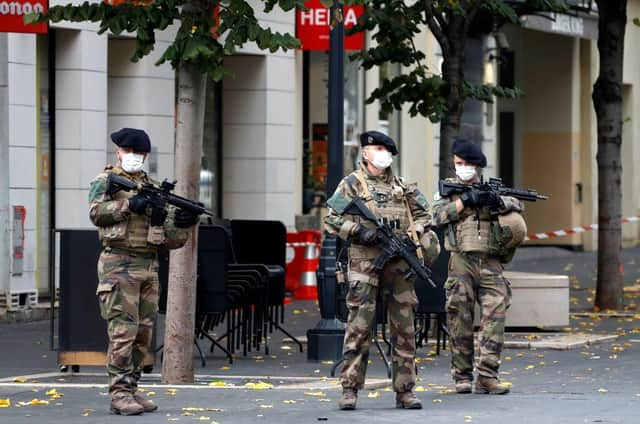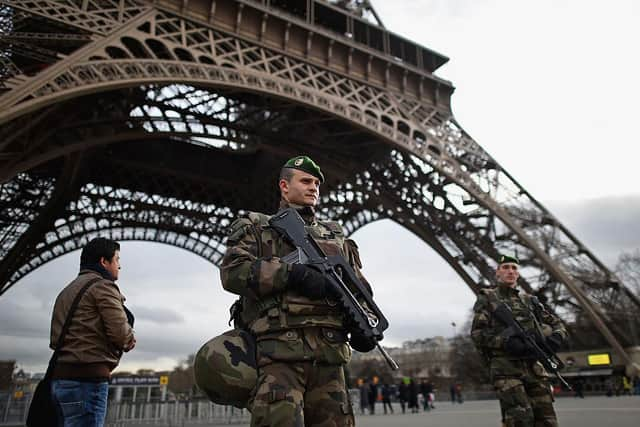France terror attacks: timeline of deadly terrorist attacks in French towns and cities after Nice stabbings - and what President Macron has said


Between 1970 and 2015, there were 2,616 incidents of terrorism in France.
That's an average of over 65 a year.
Why is that number so high?


Recent days have seen even more tragic losses of life as a result of terror-related incidents, including a knife attack in the city of Nice which left three dead and several others injured near a church.
Here is everything you need to know.
France's history with terrorism
Advertisement
Hide AdAdvertisement
Hide AdFrance has a long history of terrorist attacks carried out by a variety of groups, from the extreme right and left, to Basque, Breton and Corsican nationalists.
One of the first recorded attacks came in 1800 with the plot of the rue Saint-Nicaise, an unsuccessful attempt to assassinate Napoleon Bonaparte in Paris which killed five people and injured 26 others.
Anarchists carried out bombings and assassination attempts throughout the 19th century, and attacks began to become more commonplace in the 20th century.
A number of incidents associated with the Algerian War took place during the 1950s and 60s, including the Vitry-Le-François train bombing, the 20th century’s deadliest terror attack on French soil.
An attack on a Strasbourg to Paris train carried out in 1961 by the Organisation armée secrète (OAS), a paramilitary organisation opposed to the independence of Algeria in the Algerian War, it left 28 dead and injured over 100 others.
Various Middle Eastern factions carried out shootings and bombings in the 1970s and 80s, while at the same time France saw its first occurrences with religious extremism owing to its involvement in the Lebanese civil war.
It's the threat of Islamist extremism that remains most prescient in the country today, and numerous jihadist attacks have been carried out in the 2010s.
These include the 2015 Paris attacks, which usurped the Vitry-Le-François bombing as the country's deadliest.
What happened this week?
Advertisement
Hide AdAdvertisement
Hide AdThree people were killed and several others injured in a knife attack near a church in the Notre-Dame area of Nice in the early hours of Thursday 29 October morning, reported French media.
One of the victims was "virtually beheaded", said the French chief anti-terrorism prosecutor.
The Tunisian suspect shot by police had only recently arrived in Europe, officials said – they remain in a critical condition.
President Emmanuel Macron described the incident as an "Islamist terrorist attack", and announced a rise in the number of soldiers being deployed to protect public places like churches and schools from 3,000 to 7,000.
Why is France such a target?
There are a number of reasons why France is seen as such a target in the eyes of would-be terrorists, particularly when it comes to religious extremism.
France's foreign policy towards Muslim countries and jihadist fronts means the country is often painted as the spearhead directed against jihadist groups in Africa, much like the United States is seen as the main force opposing jihadist groups in the Middle East.
This, combined with France’s history of colonisation of Muslim countries, combines to allow jihadist propaganda to preach the influence of French culture and politics as a threat to Islamic identity.
Advertisement
Hide AdAdvertisement
Hide AdFrance is also an officially secular nation, meaning it is not connected with religious or spiritual matters, and jihadists perceive this to be hostile towards Islam.
Many extremists label the country as "the flagship of disbelief", with no law against blasphemy allowing a satirical press (with publications like the infamous Charlie Hebdo) which is less respectful towards religion than that of somewhere like the UK to thrive.
France also faces problems with homegrown terrorism, with right-wing attacks an issue, often carried out in response to attacks by religious extremists.
In the aftermath of the Charlie Hebdo shooting, six mosques and a restaurant were attacked with grenades and improvised explosive devices, in acts deemed as right-wing terrorism by authorities.
What is the the risk of terrorism in France?
According to the FCDO, terrorists are “very likely” to try to carry out attacks in France.
Attacks could be indiscriminate including in places frequented by foreign nationals such as shopping centres, entertainment establishments, public transport and places of worship.
Methods of attack have included knife attacks, shootings, bombings, as well as vehicle attacks. Due to ongoing threats to France by Islamist terrorist groups, the French government has warned the public to be extra vigilant.
